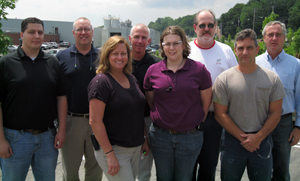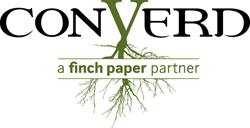Displaying items by tag: Finch Paper
Finch Paper Welcomes Michael McLarty as VP
Finch Paper LLC announces the appointment of Michael McLarty as Vice President of Forest Management and Wood Procurement. In this role, Mr. McLarty will oversee  Finch Forest Management and its staff of professional foresters, as well as lead the wood sourcing team to secure and sustain timber sourced from local, Northeastern forests.
Finch Forest Management and its staff of professional foresters, as well as lead the wood sourcing team to secure and sustain timber sourced from local, Northeastern forests.
Mr. McLarty is a Registered Professional Forester from Northwestern Ontario with more than 15 years of experience in the forest industry. He was most recently the Timberlands Manager for Northern Pulp Nova Scotia Corporation, where he managed fiber procurement and forestland and the company’s forest seedling nursery. Prior to moving to Nova Scotia, Mike was employed with Kimberly-Clark, Neenah Paper, and with Buchanan Forest Products, where he was responsible for forest management activities on both the Ogoki and Kenogami Forests. He is also experienced in strategic, long-term timber harvest planning, regeneration and silviculture programs.
Michael succeeds Roger Dziengeleski, who recently retired from Finch Paper after 33 years of service. During his tenure, Finch became a leader in sustainable forestry standards and launched the innovative Finch Forest Management division, which provides consulting forestry services to landowners across the Northeast.
Finch Paper President and CEO Joseph F. Raccuia said the addition of Mr. McLarty to Finch’s senior leadership team will help drive the company’s sustainability initiatives and further establish Finch Forest Management as an ever-growing, profitable segment of Finch Paper.
“Finch was the first integrated paper mill in the U.S. to receive both Forest Management and Chain-of-Custody certifications from the Forest Stewardship Council and is one of only a few paper companies with an active forestry staff. I’m happy to have Mike continue our industry leading forestry efforts,” Mr. Raccuia said, adding that with its new Family Forest Owner program, Finch is again leading the way in helping small landowners meet certification standards and obtain premium market value from their wood.
Michael earned an Honors Bachelor of Science Degree in Forestry from Lakehead University in Thunder Bay, Ontario in 1999.
Finch Paper and Omya Structure Long-Term Partnership to Drive Innovation
Finch and Omya to expand process capabilities in the Glens Falls mill; business agreement expected to expand grade lines well into the future
Finch Paper, a dynamic uncoated paper company, has announced a long-term supply agreement with Omya, a leading manufacturer Precipitated Calcium Carbonate (PCC).
The Finch mill, established in 1865, has a long history of manufacturing innovation. Its integrated infrastructure has allowed Finch to capitalize on integrated processes which in turn improves quality control and financial performance. Finch Paper was one of the first paper mills to construct its own PCC plant in 1984, and now looks to Omya’s technological advancements and process capabilities to accelerate their success in new markets.

Omya is a leading global producer of industrial minerals derived from calcium carbonate.
Paper being just one of their major markets, Omya operates nearly two dozen PCC plants in paper mills around the world. Finch Paper President and CEO Joseph Raccuia said “Omya has developed proprietary operating techniques that, combined with new investments we are making in our own plant, will take our operations to a whole new level.”
In a unique arrangement, the experienced team of Finch employees will continue to operate the PCC plant. Omya employees will be on-site on a regular basis, training the Finch Paper PCC team in these advanced operating practices. Omya Regional Sales Manager Tim Bradley said “Our organization is dedicated to finding solutions that increase the viability of the paper mills across the U.S.” The strategic partnership, built upon a mutual respect, is a key advancement within both companies’ business strategy.
“The Finch operators not only understand PCC, but also have an intimate knowledge of the papermaking process,” Tim Bradley said. “Their holistic approach is a definite advantage in terms of quality, speed and cost.”
Precipitated Calcium Carbonate is used to fill gaps between the fiber in a sheet of paper.
The “filler” contributes to important paper characteristics such as brightness, opacity, and bulk. PCC is formed by adding carbon dioxide gas to lime and water. Producing its own PCC is more economical for Finch than buying this ingredient, but also enables the company to capture and re-use 50 million pounds per year of carbon dioxide from its Power Plant rather than emitting the greenhouse gases into the air.
PCC can be formed in a variety of particle sizes with varying surface characteristics to produce specific paper properties. The collaborative effort of Omya and Finch will augment the mill’s ability to produce tailored solutions and further supports Finch’s growth in the emerging transactional-promotional and print-on-demand book segments.
conVerd and Finch Establish Eco-Responsible Partnership
conVerd LLC and Finch Paper LLC have announced that the two companies are partnering to produce substrates for digital wide-format, screen, and commercial applications that require full-color quality with an environmental platform. The foundation of the relationship is the companies’ mutual interest in creating recyclable, renewable products.
 Previous joint developments include conVerd Enviroboard, an environmentally responsible substrate for the wide-format signage market, which is otherwise dominated by fossil-fuel based products. Enviroboard garnered significant interest since its debut and is quickly becoming the number one source of sustainable rigid media. The product was also granted the Green Product of 2010, by the International Sign Association (ISA).
Previous joint developments include conVerd Enviroboard, an environmentally responsible substrate for the wide-format signage market, which is otherwise dominated by fossil-fuel based products. Enviroboard garnered significant interest since its debut and is quickly becoming the number one source of sustainable rigid media. The product was also granted the Green Product of 2010, by the International Sign Association (ISA).
Enviroboard is made with FSC®-certified fiber and includes 10% post-consumer waste fiber. Unlike most substrates used for signage, Enviroboard is made from renewable resources and is 100% recyclable.
This closer relationship supports conVerd’s environmental position and affords the company access to Finch’s expertise in paper manufacturing and forest stewardship; as well as providing it with the supply chain management necessary to meet growing demand among large distributors, retailers and printers.
Finch Paper Appoints Dr. Peter J. Veverka to Senior Product Development Engineer
Finch Paper announces the appointment of Dr. Peter J. Veverka to its product development division as Senior Product Development Engineer.
 A published scholar and author of several patent applications, Dr. Veverka comes to Finch after a 15-year tenure with International Paper, where he most recently served as Pulp Mill Technical Leader. He also previously served as Manager for Customer Satisfaction and Product Performance Manager. At IP’s Corporate Research Center, he ultimately became Program Manager/Research Scientist II, and supervised a team of scientists and technicians responsible for applied research on coated grades throughout IP.
A published scholar and author of several patent applications, Dr. Veverka comes to Finch after a 15-year tenure with International Paper, where he most recently served as Pulp Mill Technical Leader. He also previously served as Manager for Customer Satisfaction and Product Performance Manager. At IP’s Corporate Research Center, he ultimately became Program Manager/Research Scientist II, and supervised a team of scientists and technicians responsible for applied research on coated grades throughout IP.
Dr. Veverka reports to Tom Ruch, Director of Technology and Development.
Finch CEO Joseph Raccuia says, “We are very pleased that Dr. Veverka has joined our operation. His lengthy qualifications, including extensive studies and relevant research, will prove to be a welcome asset to our Product Development Team at Finch.”
“The level of commitment to product development and working to find innovative solutions for our customers was immediately apparent in talking with the management at Finch. The size and resources at Finch promotes nimbleness and speed differentiates us from our larger competitors. I am very excited to be part of this team at Finch,” Dr. Veverka says.
Dr. Veverka holds both a Ph.D. and Master’s Degree in Pulp and Paper Engineering from IPST at Georgia Tech, as well as Master’s level studies in Process Control and Production Management in the Paper and Pulp Industry from Helsinki University of Technology. His undergraduate B.S. is in Chemical Engineering, from the University of Delaware. He has authored or co-authored eight publications and two patent applications. His articles on dynamic contact line instability have helped to provide a basis understanding of film and paper coating technology.
